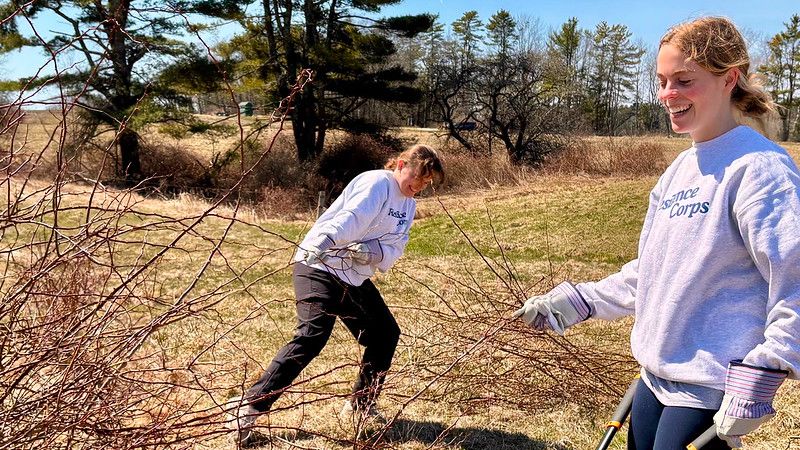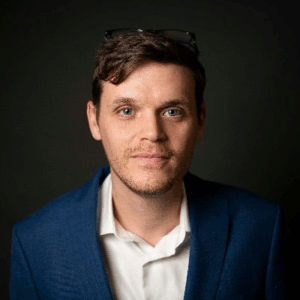The notice came late Friday, April 25: Federal funding for all eight AmeriCorps programs that Volunteer Maine administers in the state — $2.5 million annually — was being immediately terminated.
The cuts are part of a broader Trump administration effort to dismantle AmeriCorps, a 30-year-old independent federal agency whose mission is to “improve lives, strengthen communities, and foster civic engagement through service and volunteering.”
Nationwide, more than 1,000 state and national AmeriCorps programs — approximately 80% of the total — and $400 million in grants have been axed as part of the newly formed Department of Government Efficiency’s quest to rein in what the White House sees as wasteful government spending.
Here in Maine, the move threatens much-needed services in dozens of communities spanning all 16 counties, including programs focused on climate resiliency and conservation, and more than 120 AmeriCorps positions, according to Brittany Gleixner-Hayat, executive director of the Maine Commission for Community Service, also known as Volunteer Maine.
Forty-six AmeriCorps members were already working in Maine, and another 70 were scheduled to start last week — days after the termination went out.
“What is happening with these terminations is that it’s undermining the promise we made to those who answered the call to serve,” Gleixner-Hayat told The Maine Monitor. “If this continues, both with AmeriCorps members but in other parts of public service, you’re going to have generational loss and it’s going to take longer to rebuild. It’s very disappointing.”
Ellie Hughes started her AmeriCorps fellowship in January, after finishing an undergraduate degree in environmental policy. The 23-year-old Kansas City native didn’t know anyone in Maine, hadn’t spent any time here, but relocated and was excited to jumpstart what she hopes will be a long career in public service.
Last month’s news came as a crushing blow — not only for Hughes but the small town of Chebeague Island.
“I’ve definitely been feeling a lot of grief, a lot of anger about it,” Hughes said. “On a personal level, it’s really challenging to attempt to launch a career in public service at a moment like this. I’ve spent a lot of my education listening to mentors and adults around me place their hope in my generation and I feel the second we step into the real world, really commit to a community for almost nothing in return, this is the response. That’s a tough pill to swallow.”
In her first four months as a member of AmeriCorps Resilience Corps, Hughes has spearheaded Chebeague Island’s efforts to install heat pumps at municipal buildings, lower energy costs, mitigate the risk of wildfires and more. On an island with approximately 400 year-round residents and only three full-time town employees, Hughes’s presence has a huge impact.
“She is working on projects that our town never had a chance of working on because of staffing,” Chebeague Island Selectboard Member Eliza Jane Adams said in a statement.
Hughes is one of 12 Resilience Corps fellows facing an uncertain future. Kristina Egan, executive director of the Greater Portland Council of Governments, a regional agency that manages the program, said current fellows are serving at municipalities, regional planning agencies and nonprofits across the state, working on everything from water quality testing, energy efficiency, window insulation for low-income residents, renewable energy research, climate adaptation, flood tracking and regional trail planning.
For a year of service, Resilience Corps members receive a $28,000 stipend, health insurance and a $7,400 educational award at the end of their contract.
“It’s very low cost for the government,” Egan said. “And for our municipalities and organizations that we place our fellows in, they’re getting a talented person for about one-third of the cost it would be to hire them. They can do things that there isn’t capacity for those organizations to do, particularly to help communities to prepare for extreme weather, coastal erosion and sea-level rise.”
Egan condemned the cuts as “heartbreaking” and “demoralizing” for young AmeriCorps members, the local communities they serve and she and others who spent years building the program.
“I’m all for government efficiency,” she said. “The cuts that we’re experiencing on our end feel arbitrary and done without any real knowledge of what our programs and investments have yielded.”
The Greater Portland Council of Governments expects to be able to keep its fellows employed through June. After that, without AmeriCorps funding, it is unclear if the program can continue.
“Quite frankly, it’s inhumane how this termination happened,” Egan said. “They don’t deserve to be treated this way. We’re doing what we can to help them, but our best hope is for our federal delegation to work with DOGE and the Trump administration to reverse this.”
Two members of Maine’s congressional delegation — Sen. Angus King (I) and Rep. Chellie Pingree (D) — joined more than 140 members of Congress in signing an April 23 letter urging President Donald Trump to reverse course.
“We are deeply concerned these actions will prevent the agency from continuing to deliver critical services, which include supporting veterans, fighting wildfires, tutoring in schools, combatting the fentanyl epidemic, and much more,” the letter reads.
Maine also joined a coalition of more than 20 state in suing the Trump administration to block its sweeping AmeriCorps cuts.
Hughes stressed that while the general public might not fully understand AmeriCorps, given the breadth of issues it addresses, she and other members are doing important work to benefit communities.
“I do have a lot of hope in finding purpose and finding a place in the public sector, because I really want to serve communities directly,” she said. “I hope I can find a way forward, but it does seem that there just aren’t going to be any opportunities for people like me. That could absolutely mean a shift in the kind of role I envision next.”







